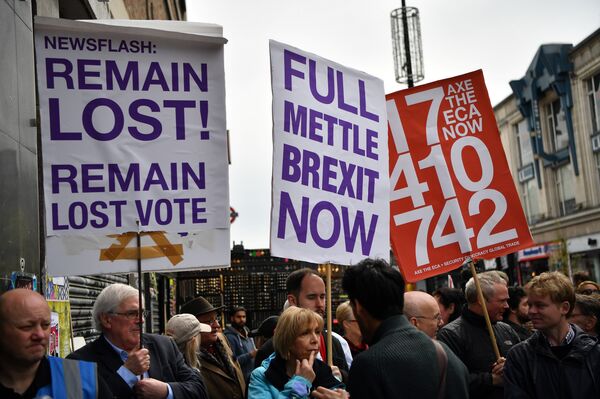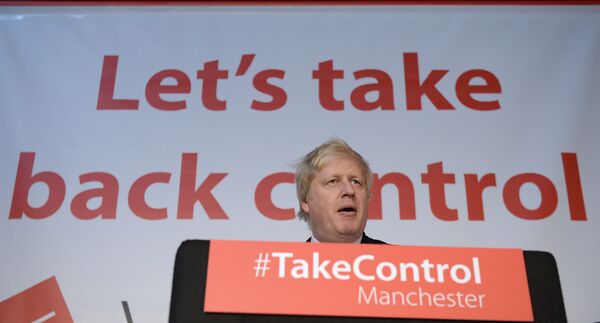The Edinburgh Book Festival played host to a panel on the nature of democracy on Friday evening.
The idea in question was deliberative democracy, a form of democracy when ideas are presented to the public and they weigh the pros and cons of ideas before making a decision.
The panel was hosted by Prof Peter John from King’s College London, who oversaw a discussion consisting of: Professor James Fishkin of Stanford University, Stella Creasy the Labour MP for Walthamstow, Tim Hughes the director of Involve, and Claudia Chwalisz from OECD Open Government Unit.
The discussion comes amid an atmosphere of confusion and anxiety in Britain regarding Brexit.

Claudia Chwalisz, author of the 'The People's Verdict' and 'The Populist Signal' opened up by outlining her 5 conditions for a successful deliberative process:
"Problem solving, the questions that are actually hard."
"Secondly is authority," participants should know critically that "your voice matters."
"Thirdly, rigorous random selection. This is because people need to trust the process and feel everyone has an equal chance."
"Fourth is public communication. Politicians should be able to respond before they know they outcome."
"Next is that there is enough time because deliberation does require learning."
Professor Fishkin, who is a scholar on Deliberative Democracy as a method, gave the audience some real examples of where people played a direct role in the deliberative democratic process.
"The forceless force of the better argument ... I think is the ultimate decider of a democracy."
"But judged confidentially so we can see at the individual level what the changes are and why."
"Can this be done with contested issues?" he said.
Citing the example of the national vote on South Korea's nuclear power infrastructure in 2017, he explained: "South Korea recently had this problem where they're going to continue to build 2 nuclear reactors when President Moon had said 'no more nukes' but that had implications not only for the energy prices but also for the importation of fossil fuels."
"So he (President Moon) put it to the people and to everyone's surprise the people decided to continue the construction, but not do any more."
When Fishkin addressed his involvement in a national project to decide on the ownership of Japan's pension funds, he said initially 70% of the people wanted to privatise the pension system.
"Of course they wanted a funded system but they didn't want to manage the fund, they wanted the money when they were in their retirement," they then saw a sharp drop in support for privatisation.
He later pointed to the example of Mongolia, which he described as a "competitive democracy."
He recalls a humorous story of the mayor of Ulaanbaatar,who complained to the professor:
"We have a tabloid news media, we have mistruth spread on social media, we have political corruption. Have you ever heard of a democracy like that?"
He responded by asking them to give deliberative democracy a try.
"If it can be done in Mongolia it can be done here," he said.

Mrs Creasy, the Labour MP for Walthamstow, gave the example of involving local people from her constituency in the democratic process
"It's impossible for me to embody such a diverse community," she explained.
"My job is to create a platform for people where their skills and their talent can be brought out."
She also had to fend off 2 criticisms from the audience.
The first came from an audience member who asked if deliberative democracy could have been used to prevent the Iraq war, which was led by Tony Blair's Labour government.
Another called her an "abuser of democracy" for the Labour Party's opposition to a vote on Scottish independence.
Addressing the accusation directly, she answered: "When I look at society and when I look at how people are polarising and frankly Sir when I look at people using that kind of language to find further reasons to find somebody else wanting."
Tim Hughes, the director of 'Involve', which is a charity which aims to make people more involved in decision-making in all areas of social life, began by saying that "politics so often as we've practised it keeps those deep complexities as far away from people as possible."
"The principles of citizens assemblies, that kind of deliberative focus is ordinary members of the public being involved in those processes," he added.
"We've found that citizens absolutely are up for this and they actually quite enjoy it."
The discussion comes with only 4 months to go until the UK is set to leave the European Union, and as the very idea of democracy and what it means to exist in democratic institutions is being called into question.
The 'People's Vote' campaign is demanding a second vote with the option to remain in the EU on the ballot, citing a lack of clarity over what 'leave' actually meant.
There have even been attempts made in court against Boris Johnson for claims made during the 2016 leave campaign.
Others claim, however, that a second vote would be an affront to democracy as the referendum was already held and the decision to leave must be implemented.



